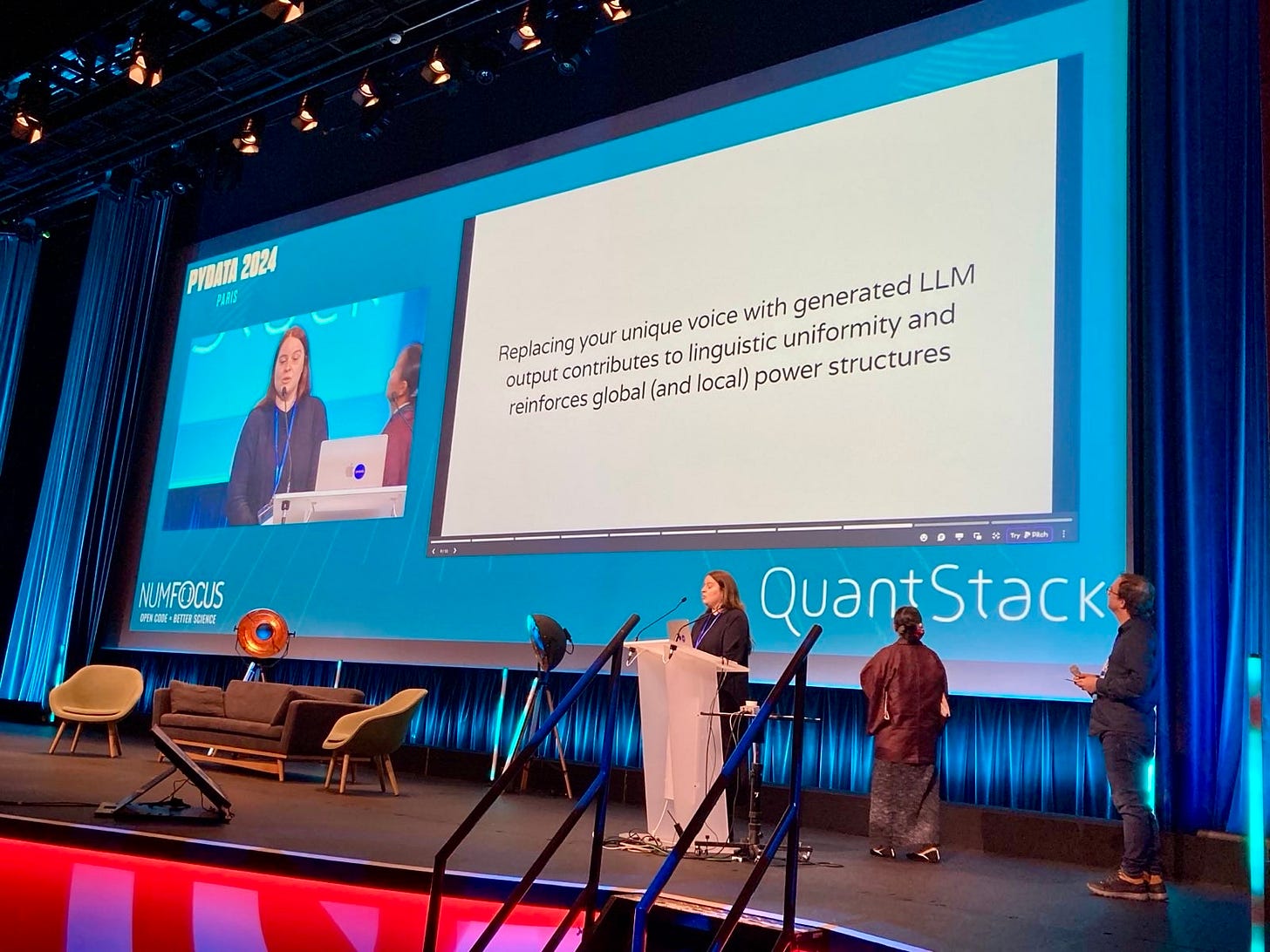Recently, I attended a tech conference centred around the Python programming language community. These conferences have keynote, regular, and "lightning talks". The length of a lightning talk can vary, but it is usually just a few minutes. The idea behind the lightning talks is to give people outside of the regular program access to the stage so they can have a (quick) word and share some of the spotlight. These talks are usually my favourite part of the conferences. People can be engaging, surprising and entertaining.
The lightning talks should involve as little preparation as possible and not have the polished look of the regular presentations. I wrote my little speech and made the slides just a few hours before presenting while at the venue. I didn't practice even once (as one should :D). I was, of course, over the time limit, and as I can't change who I am, madly unfunny.
However, I got to speak about something important to me. At the heavily (large) language model oriented conferences, we don't often voice the societal implications of the tools we build. Language is an integral human activity, and giving it over to a machine shouldn't be taken lightly.
Below is what I wrote, and hoped to say in full.
Link to my (hastily made) slides
The speech
Hi, my name is Tamara and I have climbed up this stage to talk to you about my favourite topic - language, as in the phenomenon of.
If I were to ask you: how would you describe the way you speak and write English unassisted, without AI or other tools, imperfections and all, how many of you would say "charming"? How about "meh, could be better" or as far as describing it as "crude or unprofessional"?
Let me ask you another question, and feel free to raise your hand: do you think using generative models to paraphrase your thoughts or Grammarly-like tools to edit makes you sound more professional?
Yes, we can certainly say that these tools bring you closer to expressing yourself in "correct, professional, standard English".
We know that there are many versions and subversions of English.
So, who gets to decide what "correct, professional and standard English" is?
Who gets to decide what context is professional?
Who decides which grammar structure and vocabulary enable one to be heard, and respected and open doors to employment opportunities and which lead to discrimination, devaluation and exclusion?
And who gets to learn that "correct, standard English"?
I would like to introduce you to the term language ideology, specifically to the "standard language ideology".
Language ideologies describe relations of power, language as a ground for establishing power.
So, who decides?
Power decides. Power decides what is professional, power decides what is the right language to use to be heard, respected and meet open doors on your way. Power also gatekeeps. This happens within countries and language groups, but also on a global level.
Now let's get back to LLMs.
Think, how are they trained? Who is on the Internet producing that data, with the time and resources to post and create? Who does ChatGPT sound like when it rephrases your CV?
I hear often that generative language models are of great service to people who do not speak English as their first language. But have we asked ourselves why we feel compelled to sound like someone else, and why that increases how competent we seem to others at our jobs?
Historically the global definition of what is professional has been white and wealthy. Certain accents and language expressions are considered professional and some are not. Those who do, reflect the existing and historical global power structures.
I'd like for us to think if we are really doing ourselves a service, and to those with less access, to those that are yet to come after us - are we really doing ourselves a service by pushing for even more linguistic uniformity, by generating or paraphrasing our CVs, our blog posts, and even our social media?
I believe language is meant for communication first and foremost, and the die-hard proponents of "correct, standard language" either don't know history or are purposively ignoring it for their own benefit.
I find our immigrant-English and its imperfections charming. We don't need a tool to bulldoze over our voices, to flatten them to uniformity.
I don't advocate for a boycott, but a mindful usage.
Thank you.




